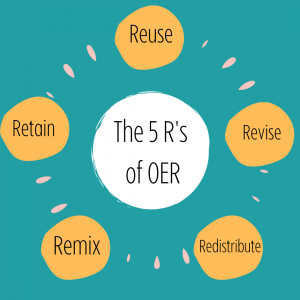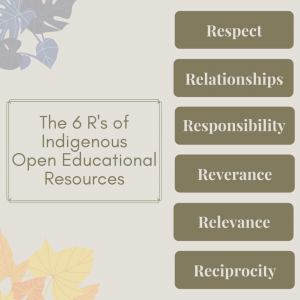Sovereignty and Tradition: Indigenous Knowledge & Open Educational Resources
What’s an OER?
With rising publication costs and tuition fees, there is a movement challenging the exclusivity of academic research that contributes to educational inaccessibility. Academic publishing companies charge institutions thousands of dollars to lease the rights to the research that their own faculty and students create [1]. The paywall barriers enforced by these companies pass the cost onto students’ tuition and prevent knowledge from being freely shared among the community. Many concerned students, academics, and community members are pushing for Open Educational Resources (OER) that will alleviate some of the inequality created by the financial interests of publishing companies. Advocates of OER fight for free and accessible education. It’s a movement to break down the barriers in academic resources (such as paywalls and archival red-tape) and allow for a sharing economy. The conversation around OER is fundamentally community centred, focused on sharing knowledge publicly and allowing for community governance over knowledge ownership rights.
What does Indigenous Knowledge Mean?
The land that is now called Canada is the ancestral home to over 600 unique First Nations bands [2]. Within each nation are many individual communities that hold their own knowledge and each have protected their knowledge for thousands of years. Indigenous knowledges encompass oral traditions, are experiential (involving all of the senses in connection to the land), and bring together the spiritual and physical world through narrative and metaphor [3]. If institutions and organizations are serious about decolonization and respecting Indigenous sovereignty then the rights to create and control Indigenous OERs must remain with the relevant communities.
The 5 R’s of OER
The barriers that regulate the educational publishing market keep students and scholars from easily sharing and accessing knowledge. These regulations often take the ownership away from the creator and lock it up behind paywalls and restrictive copyright, which is a serious issue when this impacts traditional and sacred knowledge.
The scholar David Wiley coined the “5 R’s of OER” [4]. These serve as a framework for OER creators (anyone producing academic and educational resources) and holders (institutions, open access ). The 5 R’s clearly represent the values of open access and the goals of this movement:
- Retain – the right to make, own, and control copies of the content

- Reuse – the right to use the content in a wide range of ways (e.g., in a class, in a study group, on a website, in a video)
- Revise – the right to adapt, adjust, modify, or alter the content itself (e.g., translate the content into another language)
- Remix – the right to combine the original or revised content with other open content to create something new (e.g., incorporate the content into a mashup)
- Redistribute – the right to share copies of the original content, your revisions, or your remixes with others (e.g., give a copy of the content to a friend)
Even if you are not a content creator or holder, OER projects still impact you as a student and community member. We all lose out on productive conversations and new insights when there are barriers to resources. The latest research findings may not make it to the communities that need it most. Students also bear the brunt of expensive publishing paywalls in rising tuition fees. There is also the issue that only people affiliated with academic institutions can access these resources. This creates an unequal power dynamic and does not give the community whose knowledge it is the chance to review and distribute resources to the public in a fair way.
Indigenous Knowledges and OER
UBC’s 2021 Open Access week began with a symposium on Indigenous Knowledge and OpenEducational Resources. X̱wi7x̱wa Library’s Indigenous Programs and Services Librarian Kayla Lar-Son gave a talk contextualizing the relationship between Indigenous knowledges and open education. She highlighted that there are challenges that arise from applying a westernized framework to Indigenous knowledge keeping. Indigenous knowledges are personal, holistic, experiential, sometimes orally transmitted, ecological, and they can centre the subjective narrative. Knowledge is alive and there are many truths, which are dependent on individual experiences.
Lar-Son posed the question: how can we reimagine the 5 R’s of OER to honour Indigenous ways of knowing? One of the trickier aspects of the 5 R’s is the idea around ownership. There is power in knowledge and whoever possesses this knowledge holds power. With traditional knowledges, there are complications with ownership since “authors” are not always identifiable (thus there is no “rights holder”). The community holds knowledge collectively and some knowledges are so old they are deemed “Public Domain” by Canadian copyright standards. OER projects can help Indigenous knowledges break away from oppressive publishing standards and return the rights to the communities.
There are also protocol considerations. Indigenous knowledges can be linked to traditions that inhibit open access. Within some Indigenous communities, various types of knowledge have protocols around the time of year for sharing, methods of sharing, and who can access the knowledge. Lar-Son gave an example of how some community archives are navigating traditions by using tiered-access OERs. This offers communities the opportunity to come together and decide collectively which elements of the knowledge to share with the public, and which aspects of the knowledge can only be shared with certain individuals or at specific times of the year.
The 6 R’s of Indigenous OERs
Lar-Son reframes Wiley’s 5 R’s in a way that honours Indigenous ways of knowing, and respects traditional protocols. She draws inspiration from the “R’s” of Indigenous Knowledge [5] and contextualizes this framework in relation to OERs. She lists the 6 R’s of Indigenous OERs:
- Respect – honour the knowledge sovereignty of Indigenous communities
- Relationships – build with the community to honour their traditions and protocols
- Responsibility – put community practices first and only share when and what we are allowed, and to publish in an ethical way

- Reverence – uphold what is sacred and respect sacred traditions
- Relevance – ensure the project serves the needs of the community
- Reciprocity – give back to the community through projects; don’t just take what you need
There are some questions that we need to ask before embarking on OER projects. Who’s driving the need for OER creation? What kinds of knowledges are being shared? Are there any protocols that need to be adhered to? It is only in consultation with the community who created the content that we can answer these questions.
For settlers working in education, open access, or any field that works with Indigenous knowledges, it’s critical that we situate ourselves as respectful but uninvited guests. We must work in partnership with related Indigenous communities and hold their needs at the forefront of OER projects. There may be protocols and traditions related to certain knowledges that require considerations. OER loses its power as a community driven effort if we only focus on the goal of making all knowledge accessible, in-spite of community desires. We have to have the collective autonomy of the community in our forefront.
Digital Data Rights and Indigenous Knowledges
As more resources are transferred online, we need to consider who benefits and who is harmed by knowledge access. We have seen how our personal data has been disrespected by corporations and governments and we must fight to prevent the same treatment of traditional knowledges [6][7][8]. Supporting Indigenous-led OER projects ensures that we are engaging with Traditional Knowledges in respectful and sustainable ways. Individual communities hold sovereign rights over their data, knowledge, and traditions, even when promoting open access projects. This process cannot be done with haste. Anyone engaging in OER projects relating to Indigenous knowledges must work with mindfulness and care. There is no checklist. It is a vital process to ensure we are respecting the Indigenous, ancestral sources of knowledge.
Further Questions
Do you have any ideas of how institutions can support Indigenous OER projects? How can non-Indigenous OER projects draw inspiration from the 6 R’s of Indigenous OER? Feel free to share your comments below!
Resources
Digital Tattoo has tutorials on Copyright and Open Access! We also provide resources on Open Education and check out our tutorial on Scholarly Publishing.
Xwi7xwa also has a database of Open Indigenous databases that is freely available to anyone through the UBC Library.
Check out Localcontexts.org for more information on Traditional Knowledge Rights and Indigenous self-governance around sharing data.
References
[1] The Right to Research Collation. (n.d.) Why Open Access? www.righttoresearch.org/learn/whyOA/index.shtml
[2] OECD (2020), Chapter 2. Profile of Indigenous Canada: Trends and data needs. In Linking Indigenous Communities with Regional Development in Canada, OECD Rural Policy Reviews, OECD Publishing, Paris, https://doi.org/10.1787/fa0f60c6-en.
[3] Traditional Knowledge and Technology. (n.d.) What is Indigenous Traditional Knowledge?https://blogs.ubc.ca/traditionalknowledgetechnology/revaluation-of-indigenous-cultures/what-is-indigenous-traditional-knowledge/
[4] Wiley, D. (2014, March 5). The Access Compromise and the 5th R. Improving Learning. opencontent.org/blog/archives/3221
[5] Edwards, A. (2021, August 10). Indigenous Knowledge and Pedagogy. Simon Fraser University Library. https://www.lib.sfu.ca/help/academic-integrity/indigenous-initiatives/icrc/indigenous-knowledge#indigenous-ways-of-knowing
[6] Cheung, J. (2018, July 9). Ownership of Content in Your Digital Life – Social Media (Part 1). Digital Tattoo Project.
[7] Digital Tattoo Project. (n.d.). Who Owns Your Data? https://digitaltattoo.ubc.ca/tutorials/privacy-and-surveillance/data/big-data/
[8] Short, B. (2017, January 5). Taking Control of Your Data. Digital Tattoo Project. https://digitaltattoo.ubc.ca/2017/01/05/taking-control-of-your-data/
Written By: Brittanny Dzioba
Edited By: Alex Kuskowski & Lucas Wright
Featured Image: sʔi:ɬqəy̓ qeqən (double-headed serpent post), Brent Sparrow, Musqueam by Paul H. Joseph / UBC Brand & Marketing

